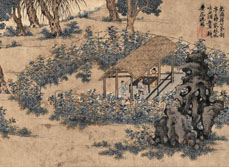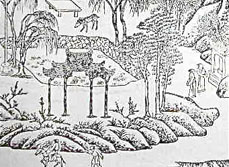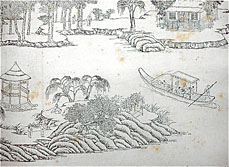Dignity, sympathy, participation
Dignity and grace in the commonplace
Literati praised the qualities of simple people, rural life and an uncomplicated relationship with nature. Aside from literary appreciations, they collected folk art and undertook projects such as building rough mountain retreats, or taking up temporary stints of itinerant Taoism - the record of Chinese tourist literature provides a sometimes whimsical record of this.
As things like mountain huts, simple boats and plantings require continuous maintenance and repair, we have only recollections (and perhaps idealizations) of these in paintings. On the left, SHEN Zhou 沈周 (1427-1509) presents a gathering in a seasonal pavilion, encircled by a remarkable wall of flowers trained in what was probably a bamboo structure. One can imagine that the sensory thrill of colour and fragrance was a matter of a very brief period and that afterwards this site was re-imagined (and re-planted) as the centre of other pleasures.
In another garden (shown in the centre image) trees have been cut and formed into a living gateway, a conceit that occurs frequently in late Ming paintings of gardens and managed landscapes. And on the right, one sees a range of fragile structures: a thatched cottage with bamboo plaiting, a grass-roofed pavilion, a trellis-covered viewing point, and a pleasure boat in wood with a cloth canopy.
 |  |  |
| SHEN Zhou 沈周 (1427-1509) Handscroll with six sections (detail) Ink and colour on paper Each section 30.5 x 45.3 cm Private collection | Huan Cui Tang garden scroll (details) circa 1600 |